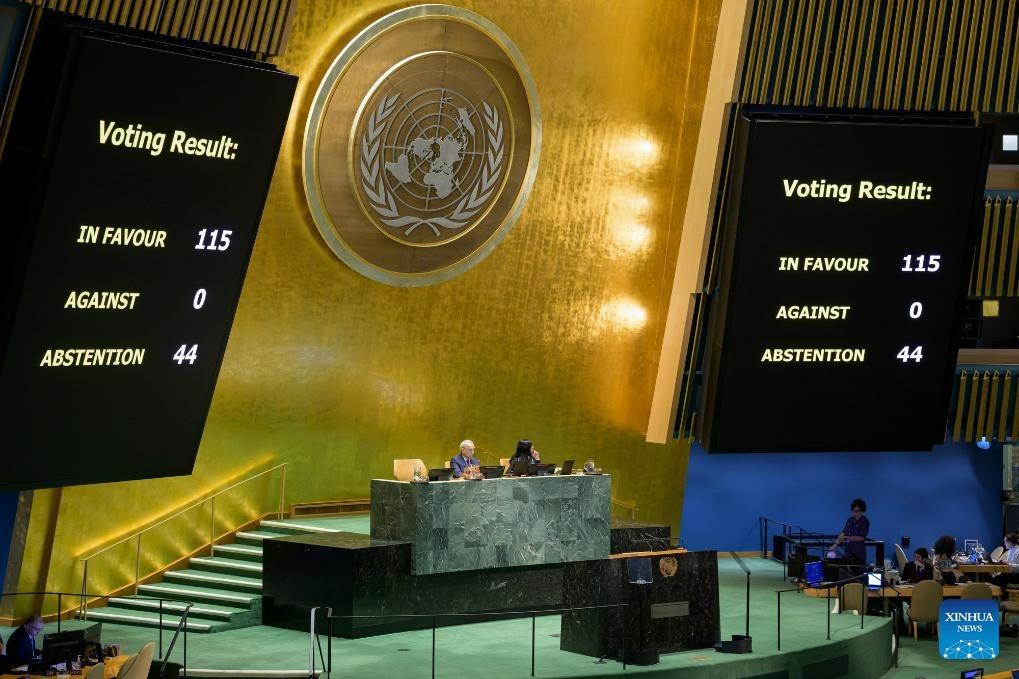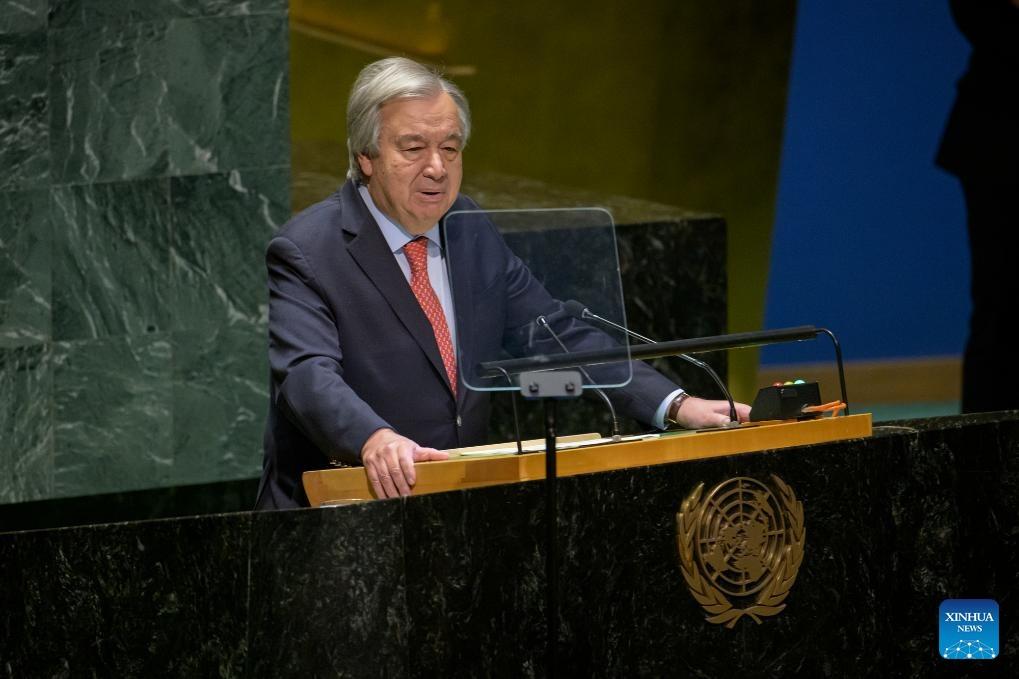 Voting results are displayed during a vote of the UN General Assembly at the UN headquarters in New York, on March 15, 2024. (UN PHOTO / HANDOUT VIA XINHUA)
Voting results are displayed during a vote of the UN General Assembly at the UN headquarters in New York, on March 15, 2024. (UN PHOTO / HANDOUT VIA XINHUA)
UNITED NATIONS – The United Nations General Assembly on Friday adopted a resolution on measures to combat Islamaphobia.
The resolution condemns any advocacy of religious hatred that constitutes incitement to discrimination, hostility or violence. It particularly condemns the incitement to discrimination, hostility or violence against Muslims as manifested in the increasing number of incidents of desecration of their holy book, attacks on mosques, sites and shrines and other acts of religious intolerance, negative stereotyping, hatred and violence against Muslims.
The resolution calls on UN member states to take all necessary measures to combat religious intolerance, negative stereotyping, hatred, incitement to violence and violence against Muslims and prohibit by law incitement to violence and violence against persons on the grounds of their religion or belief.
READ MORE: Free speech should not be talisman for Islamophobia, says China envoy
It also calls on member states to engage with all relevant stakeholders to promote the virtues of interreligious and intercultural dialogue and dialogue among civilizations, respect and acceptance of differences, tolerance, respect for religious and cultural diversity, peaceful coexistence and cohabitation, inclusion and respect for human rights, and to reject the spread of hate speech.
We cannot stand on the sidelines while hatred and bigotry run wild. Today's event reminds us that we all have a responsibility to confront and root out the scourge of anti-Muslim bigotry.
Antonio Guterres, UN Secretary-General
The resolution requests the UN secretary-general to appoint a UN special envoy to combat Islamophobia and to submit a report to the General Assembly at the upcoming session on the implementation of the resolution and on measures taken by member states and the United Nations to combat Islamophobia.
The draft resolution, tabled by Pakistan, won 115 votes in favor, none against, with 44 abstentions.
Two amendments to the draft resolution, tabled by the 27 European Union member states and co-sponsored by Britain, were rejected by the General Assembly. One amendment would have removed the reference to the desecration of the holy book. The other would have asked the UN secretary-general to appoint a focal point instead of a special envoy to combat Islamophobia.
ALSO READ: Anti-Muslim incidents jump in US amid Israel-Gaza war
The adoption of the resolution coincides with the International Day to Combat Islamophobia.
 UN Secretary-General Antonio Guterres speaks at a high-level event to mark the International Day to Combat Islamophobia at the UN Headquarters in New York, on March 15, 2024. (UN PHOTO / HANDOUT VIA XINHUA)
UN Secretary-General Antonio Guterres speaks at a high-level event to mark the International Day to Combat Islamophobia at the UN Headquarters in New York, on March 15, 2024. (UN PHOTO / HANDOUT VIA XINHUA)
Guterres calls out social media
Calling out social media for the spread of Islamophobia and other forms of bigotry, UN Secretary-General Antonio Guterres said: “Around the world, we see a rising tide of anti-Muslim hate and bigotry."
“We must call this what it is: hate – plain and simple.”
Purveyors of hate speech are misusing the most powerful megaphone in history – social media – to amplify and spread their despicable ideologies. Online platforms have become breeding grounds for extremist ideologies and harassment, he told a high-level event to mark the International Day to Combat Islamophobia. This not only deepens divisions. It fuels real-life violence, he warned.
Saying that this alarming trend is part of a wider pattern of supremacist ideologies and attacks against Jews, minority Christian communities and many others, he said hatred of one group fuels hatred of another. Hate destroys the fabric of the societies and undermines the equality, understanding and respect for human rights, upon which a peaceful future and a peaceful world depend, said the UN chief.
"We cannot stand on the sidelines while hatred and bigotry run wild. Today's event reminds us that we all have a responsibility to confront and root out the scourge of anti-Muslim bigotry.”
Underscoring the need for political leaders to lead the way and foster social cohesion, not fear, he said governments must condemn inflammatory discourse and safeguard religious freedom, in particular for minorities.
Digital platforms must moderate and prevent the spread of hateful content, while protecting users from harassment. Artificial intelligence must reduce biases and stereotypes, not reproduce and amplify them. All people must do their part to dismantle the walls of intolerance and division, he added.


